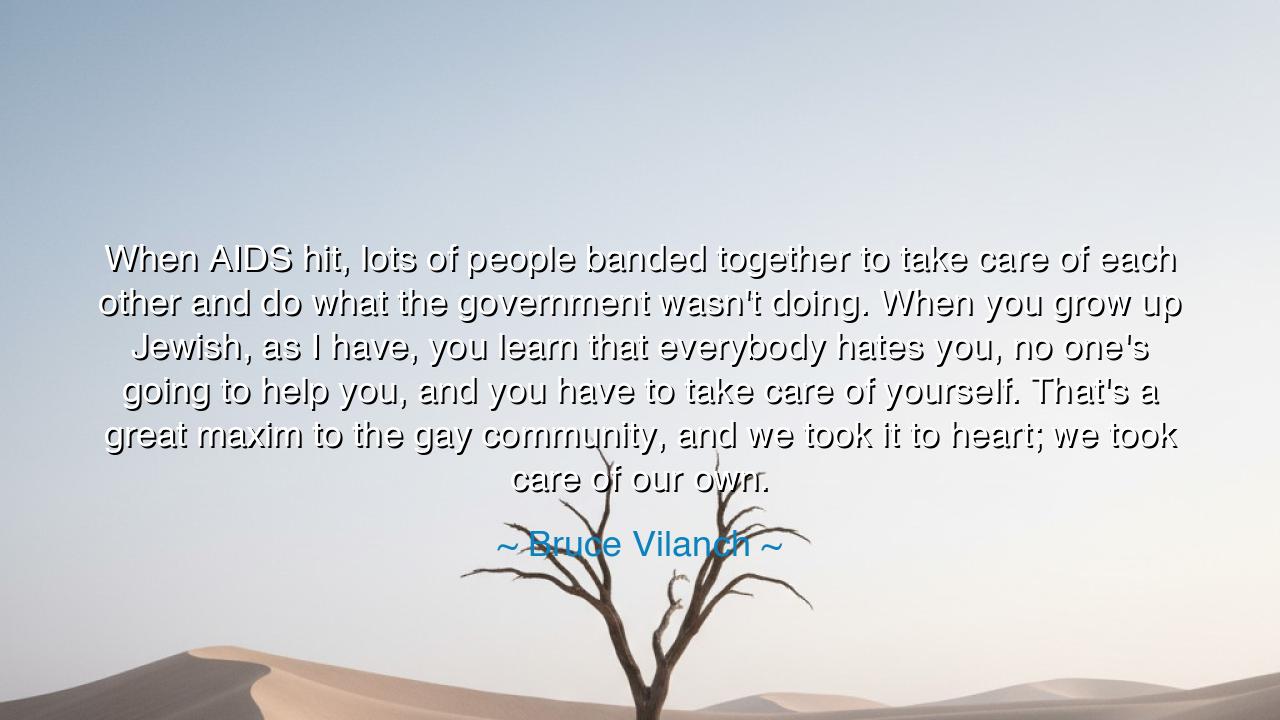
When AIDS hit, lots of people banded together to take care of
When AIDS hit, lots of people banded together to take care of each other and do what the government wasn't doing. When you grow up Jewish, as I have, you learn that everybody hates you, no one's going to help you, and you have to take care of yourself. That's a great maxim to the gay community, and we took it to heart; we took care of our own.






The words of Bruce Vilanch rise like a torch in the twilight of human struggle: “When AIDS hit, lots of people banded together to take care of each other and do what the government wasn't doing. When you grow up Jewish, as I have, you learn that everybody hates you, no one's going to help you, and you have to take care of yourself. That's a great maxim to the gay community, and we took it to heart; we took care of our own.” In these words, there burns a truth as old as exile and as fierce as love—the truth that when the world turns away, the people of heart and courage turn toward one another. This is a hymn to self-reliance, yes—but also to solidarity, to the sacred duty of taking care of your own when the hands of power withdraw in indifference.
In the days when AIDS swept across the lands like a silent fire, countless lives were lost—not only to the sickness of the body, but to the sickness of society. Fear ruled, compassion fled, and even the mighty institutions of government turned their eyes away. Yet, from this shadow rose a light not born of law or decree, but of human mercy. Men and women, scorned and forgotten, began to band together, creating networks of care, homes for the dying, meals for the weak, and arms to hold the abandoned. It was the rebirth of an ancient truth: when the world rejects you, your community becomes your kingdom.
Vilanch speaks, too, from the ancient memory of the Jewish people, whose history is a saga of endurance. For centuries, they lived under suspicion, persecution, and exile, learning the hard lesson that no one will save you but yourselves. From this crucible was forged a spirit of resilience—an unbreakable will to preserve life, dignity, and culture against the tides of hatred. The saying “we take care of our own” was not born from pride, but from necessity, from the knowledge that survival depends on unity when the world’s compassion falters. In this, Vilanch found a kinship between the Jewish and the gay experience—a shared inheritance of struggle and self-sustaining strength.
History echoes this truth again and again. When the plague of fear and neglect fell upon the gay community in the 1980s, it was not governments that saved lives—it was friends, lovers, neighbors, and activists who became healers and warriors. Organizations like ACT UP and the Gay Men’s Health Crisis rose not from power, but from pain—from a love so fierce it refused to let death have the final word. These were the unsung heroes of compassion, whose banners bore no crest but the human heart. They embodied the wisdom Vilanch recalls: that in the absence of aid, one must become the aid; in the face of abandonment, one must become the family.
This lesson, though born from tragedy, is not a cry of bitterness—it is a call to awakening. For it reminds us that strength is not granted; it is forged. When Vilanch says, “We took care of our own,” he speaks of a power that no prejudice can extinguish: the power of a people who refuse to surrender their humanity. It is the same power that sustained the Jews through centuries of exile, that lifted enslaved peoples into freedom, that carries the oppressed toward justice when institutions fail them. The world may forget its duty, but the human soul, when awakened, remembers.
Let every generation remember this: reliance on others begins with reliance on ourselves. Do not wait for leaders to lead you into compassion. Do not wait for laws to tell you when to love. When injustice rises and silence spreads like frost, light your own fire. Gather with those who share your burden, and together become the warmth that others have denied you. In unity, even the powerless become powerful; in shared struggle, even the outcast becomes immortal.
So the lesson stands clear as morning light: Take care of your own. But do not stop there—let your circle widen, until the definition of “your own” becomes as vast as humanity itself. Build communities of courage. Defend one another fiercely. Let compassion be your rebellion against cruelty. And when you find yourself alone in the dark, remember those who once said, “No one will help you”—and prove them wrong, by helping someone else.
Thus, the wisdom of Vilanch becomes not only the testament of a people, but a law of the spirit: that when the world turns cold, the heart must burn hotter; that when society withholds care, love must multiply. This is the eternal teaching—to survive by unity, to triumph by compassion, to heal by each other’s hands. For in the end, the true measure of any community is not the strength of its rulers, but the courage of those who, when all else fails, still choose to care.






AAdministratorAdministrator
Welcome, honored guests. Please leave a comment, we will respond soon